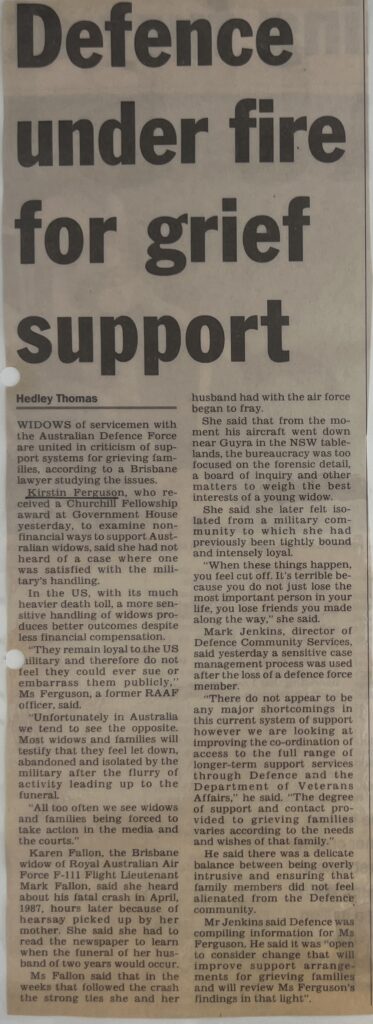
Complete the Head & Heart Leader Scale™ and receive a free, personalised report here.
Complete the Head & Heart Leader Scale™ and receive a free, personalised report here.
Hedley Thomas
16 August 2003
WIDOWS of servicemen with the Australian Defence Force are united in criticism of support systems for grieving families, according to a Brisbane lawyer studying the issues.
Kirstin Ferguson, who received a Churchill Fellowship award at Government House yesterday, to examine non-financial ways to support Australian widows, said she had not heard of a case where one
was satisfied with the military’s handling.
In the US, with its much heavier death toll, a more sensitive handling of widows produces better outcomes despite less financial compensation.
“They remain loyal to the US military and therefore do not feel they could ever sue or embarrass them publicly,” Ms Ferguson, a former RAAF officer, said.
“Unfortunately in Australia we tend to see the opposite. Most widows and families will testify that they feel let down, abandoned and isolated by the military after the flurry of activity leading up to the funeral.
“All too often we see widows and families being forced to take action in the media and the courts.”
Karen Fallon, the Brisbane widow of Royal Australian Air Force F-111 Flight Lieutenant Mark Fallon, said she heard about his fatal crash in April, 1987, hours later because of hearsay picked up by her mother. She said she had to read the newspaper to learn when the funeral of her husband of two years would occur.
Ms Fallon said that in the weeks that followed the crash the strong ties she and her husband had with the air force began to fray.
She said that from the moment his aircraft went down near Guyra in the NSW tablelands, the bureaucracy was too focused on the forensic detail, a board of inquiry and other matters to weigh the best interests of a young widow.
She said she later felt isolated from a military community to which she had previously been tightly bound and intensely loyal.
“When these things happen, you feel cut off. It’s terrible because you do not just lose the most important person in your life, you lose friends you made along the way,” she said.
Mark Jenkins, director of Defence Community Services, said yesterday a sensitive case management process was used after the loss of a defence force member.
“There do not appear to be any major shortcomings in this current system of support however we are looking at improving the co-ordination of access to the full range of longer-term support services through Defence and the Department of Veterans Affairs,” he said. “The degree of support and contact provided to grieving families varies according to the needs and wishes of that family.”
He said there was a delicate balance between being overly intrusive and ensuring that family members did not feel alienated from the Defence community.
Mr Jenkins said Defence was compiling information for Ms Ferguson. He said it was “open to consider change that will improve support arrangements for grieving families and will review Ms Ferguson’s findings in that light”.





